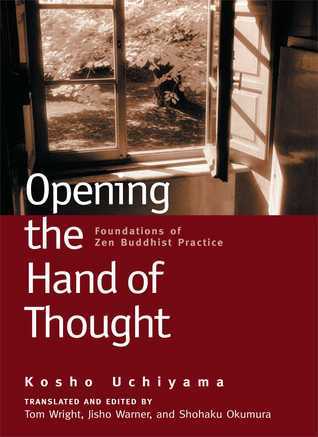
Opening the Hand of Thought: Foundations of Zen Buddhist Practice
by Kosho Uchiyama
14 popular highlights from this book
Key Insights & Memorable Quotes
Below are the most popular and impactful highlights and quotes from Opening the Hand of Thought: Foundations of Zen Buddhist Practice:
“As an old man I have my own practice. It is different from that of youth. It is not working facing outward, but just facing inward, gazing at myself. And like the clouds that disappear into the expansive sky I, too, will disappear quietly.”
“In other words, without being tossed about by personal feelings and ideas, just returning to the life of my true self, without envying or being arrogant toward those around me, neither being self-deprecating nor competing with others, yet on the other hand not falling into the trap of laziness, negligence, or carelessness—just manifesting that life of my self with all the vigor I have—here is where the glory of life comes forth and where the light of buddha shines.53 Religious light shines where we manifest our own life.”
“Just Bow Putting my right and left hands together as one, I just bow. Just bow to become one with Buddha and God. Just bow to become one with everything I encounter. Just bow to become one with all the myriad things. Just bow as life becomes life. This was Uchiyama Roshi’s final poem, completed on the last day of his life.”
“This spiral perpetuates itself because the knowledge to develop our standard of living, which is the wisdom of our modern scientific and technological civilization, was born in a matrix of dissatisfaction. Dissatisfaction is the mother of invention and progress. That is why no matter how much scientific or technological progress is made, people will never be satisfied. As long as they walk along this path shouldering the bag of desires and dissatisfaction, every time they open that bag, even hundreds or thousands of years from now, they will always be pulling out their dissatisfaction along with their new ideas.”
“Therefore, we must always aim at doing correct zazen, without being concerned with perceiving the mark as having been hit.”
“Just sitting, transcending good or evil, satori or delusion, is the zazen that transcends the sage and the ordinary man.”
“The expression of universal self is a practice that is eternal, but to the extent that we don’t walk it ourselves, it won’t be realized, it won’t be our path. May this—the actualization of our universal self—be all our life work.”
“What is most crucial is to remember to pursue the way of the self selflessly, not for any profit. Because we concretely are universal self, there is no particular value in talking about it. Yet if we don’t make every effort to manifest it, just knowing about it is useless.”
“Opening the hand of thought” is the very act of zazen. It is the original Buddhist practice of not grasping and clinging, the practice of freedom, as it occurs in this very moment in your mind.”
“When we let go of our thoughts and become vividly aware, all the illusions that create desire, anger, and group stupidity vanish immediately.”
“When we open the hand of thought, the things made up inside our heads fall away; that’s the meaning of dropping off body and mind.”
“Zazen as true Mahayana teaching is always the whole self just truly being the whole self, life truly being life.”
“All of us, regardless of whether we realize it or not, are living out the self as the whole universe.”
“The academic world does not take up the problem of things coming into being and dying. Rather, what it takes up is humankind as a phenomenon that was not born and won’t die. However, to view things from that perspective entails coming to the realization that when I die I will be abandoned by truth.”


